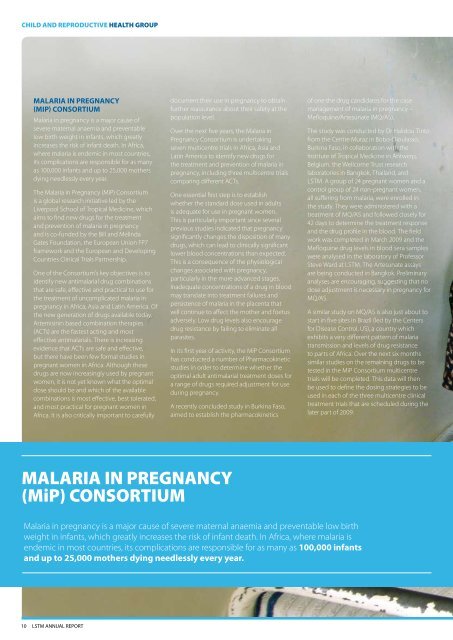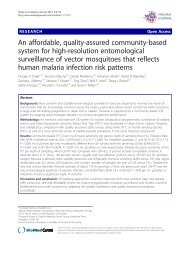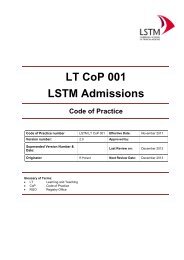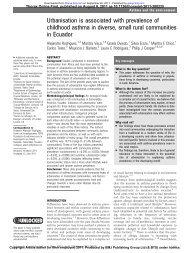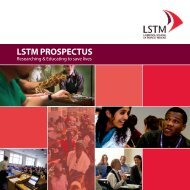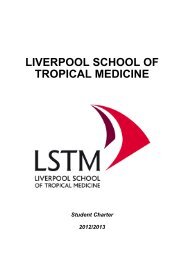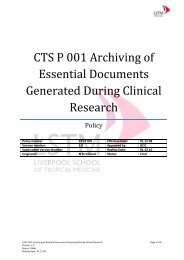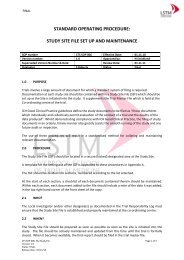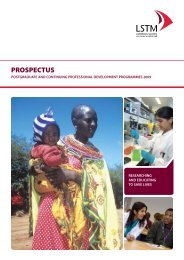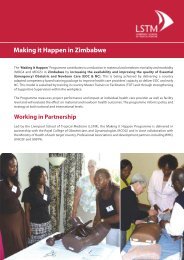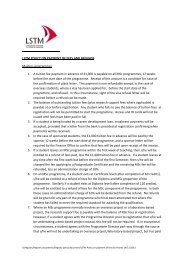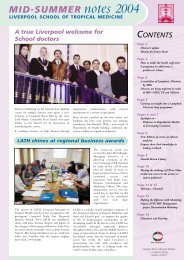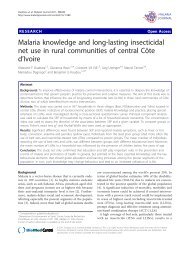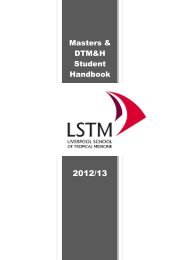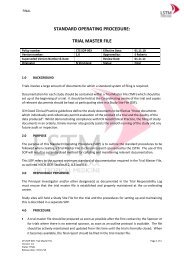Annual Report 2008 - 2009 - Liverpool School of Tropical Medicine
Annual Report 2008 - 2009 - Liverpool School of Tropical Medicine
Annual Report 2008 - 2009 - Liverpool School of Tropical Medicine
You also want an ePaper? Increase the reach of your titles
YUMPU automatically turns print PDFs into web optimized ePapers that Google loves.
CHILD AND REPRODUCTIVE HEALTH GROUP<br />
MALARIA IN PREGNANCY<br />
(MiP) CONSORTIUM<br />
Malaria in pregnancy is a major cause <strong>of</strong><br />
severe maternal anaemia and preventable<br />
low birth weight in infants, which greatly<br />
increases the risk <strong>of</strong> infant death. In Africa,<br />
where malaria is endemic in most countries,<br />
its complications are responsible for as many<br />
as 100,000 infants and up to 25,000 mothers<br />
dying needlessly every year.<br />
The Malaria in Pregnancy (MiP) Consortium<br />
is a global research initiative led by the<br />
<strong>Liverpool</strong> <strong>School</strong> <strong>of</strong> <strong>Tropical</strong> <strong>Medicine</strong>, which<br />
aims to find new drugs for the treatment<br />
and prevention <strong>of</strong> malaria in pregnancy<br />
and is co-funded by the Bill and Melinda<br />
Gates Foundation, the European Union FP7<br />
framework and the European and Developing<br />
Countries Clinical Trials Partnership.<br />
One <strong>of</strong> the Consortium’s key objectives is to<br />
identify new antimalarial drug combinations<br />
that are safe, effective and practical to use for<br />
the treatment <strong>of</strong> uncomplicated malaria in<br />
pregnancy in Africa, Asia and Latin America. Of<br />
the new generation <strong>of</strong> drugs available today,<br />
Artemisinin based combination therapies<br />
(ACTs) are the fastest acting and most<br />
effective antimalarials. There is increasing<br />
evidence that ACTs are safe and effective,<br />
but there have been few formal studies in<br />
pregnant women in Africa. Although these<br />
drugs are now increasingly used by pregnant<br />
women, it is not yet known what the optimal<br />
dose should be and which <strong>of</strong> the available<br />
combinations is most effective, best tolerated,<br />
and most practical for pregnant women in<br />
Africa. It is also critically important to carefully<br />
document their use in pregnancy to obtain<br />
further reassurance about their safety at the<br />
population level.<br />
Over the next five years, the Malaria in<br />
Pregnancy Consortium is undertaking<br />
seven multicentre trials in Africa, Asia and<br />
Latin America to identify new drugs for<br />
the treatment and prevention <strong>of</strong> malaria in<br />
pregnancy, including three multicentre trials<br />
comparing different ACTs.<br />
One essential first step is to establish<br />
whether the standard dose used in adults<br />
is adequate for use in pregnant women.<br />
This is particularly important since several<br />
previous studies indicated that pregnancy<br />
significantly changes the disposition <strong>of</strong> many<br />
drugs, which can lead to clinically significant<br />
lower blood concentrations than expected.<br />
This is a consequence <strong>of</strong> the physiological<br />
changes associated with pregnancy,<br />
particularly in the more advanced stages.<br />
Inadequate concentrations <strong>of</strong> a drug in blood<br />
may translate into treatment failures and<br />
persistence <strong>of</strong> malaria in the placenta that<br />
will continue to affect the mother and foetus<br />
adversely. Low drug levels also encourage<br />
drug resistance by failing to eliminate all<br />
parasites.<br />
In its first year <strong>of</strong> activity, the MiP Consortium<br />
has conducted a number <strong>of</strong> Pharmacokinetic<br />
studies in order to determine whether the<br />
optimal adult antimalarial treatment doses for<br />
a range <strong>of</strong> drugs required adjustment for use<br />
during pregnancy.<br />
A recently concluded study in Burkina Faso,<br />
aimed to establish the pharmacokinetics<br />
<strong>of</strong> one the drug candidates for the case<br />
management <strong>of</strong> malaria in pregnancy –<br />
Mefloquine/Artesunate (MQ/AS).<br />
The study was conducted by Dr Halidou Tinto<br />
from the Centre Muraz in Bobo-Dioulasso,<br />
Burkina Faso, in collaboration with the<br />
Institute <strong>of</strong> <strong>Tropical</strong> <strong>Medicine</strong> in Antwerp,<br />
Belgium, the Wellcome Trust research<br />
laboratories in Bangkok, Thailand, and<br />
LSTM. A group <strong>of</strong> 24 pregnant women and a<br />
control group <strong>of</strong> 24 non-pregnant women,<br />
all suffering from malaria, were enrolled in<br />
the study. They were administered with a<br />
treatment <strong>of</strong> MQ/AS and followed closely for<br />
42 days to determine the treatment response<br />
and the drug pr<strong>of</strong>ile in the blood. The field<br />
work was completed in March <strong>2009</strong> and the<br />
Mefloquine drug levels in blood sera samples<br />
were analysed in the laboratory <strong>of</strong> Pr<strong>of</strong>essor<br />
Steve Ward at LSTM. The Artesunate assays<br />
are being conducted in Bangkok. Preliminary<br />
analyses are encouraging, suggesting that no<br />
dose adjustment is necessary in pregnancy for<br />
MQ/AS.<br />
A similar study on MQ/AS is also just about to<br />
start in five sites in Brazil (led by the Centers<br />
for Disease Control, US), a country which<br />
exhibits a very different pattern <strong>of</strong> malaria<br />
transmission and levels <strong>of</strong> drug resistance<br />
to parts <strong>of</strong> Africa. Over the next six months<br />
similar studies on the remaining drugs to be<br />
tested in the MiP Consortium multicentre<br />
trials will be completed. This data will then<br />
be used to define the dosing strategies to be<br />
used in each <strong>of</strong> the three multicentre clinical<br />
treatment trials that are scheduled during the<br />
later part <strong>of</strong> <strong>2009</strong>.<br />
MALARIA IN PREGNANCY<br />
(MiP) CONSORTIUM<br />
Malaria in pregnancy is a major cause <strong>of</strong> severe maternal anaemia and preventable low birth<br />
weight in infants, which greatly increases the risk <strong>of</strong> infant death. In Africa, where malaria is<br />
endemic in most countries, its complications are responsible for as many as 100,000 infants<br />
and up to 25,000 mothers dying needlessly every year.<br />
10 LSTM ANNUAL REPORT


